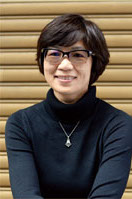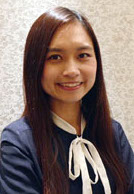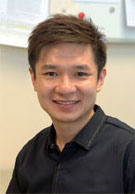通識教育模範教學獎 2017
時間: 3:45-5:30pm
地點: 大學書店文化活動專區,康本國際學術園一樓,香港中文大學
本年度榮獲提名的老師有十一位。教務會通識教育委員會議決頒發「通識教育模範教學獎」予人類學系的陳如珍博士,生命科學學院的崔佩怡博士,以及化學系的黃暉博士。
陳如珍博士

Dr. Chen Ju-chen obtained her Bachelor’s degree in Psychology from National Taiwan University and MA and Ph.D. degrees in Anthropology from Rutgers, The State University of New Jersey in the USA. She is interested in gender, migration, and aspiration. Her scholarly interests cover a few groups and geographic locations: female migrant workers (Mingong) in China, Filipino domestic workers in Hong Kong, and independent musicians and music event organizers in Hong Kong and Taiwan. She has been teaching in the Department of Anthropology since 2009. Over the years, she has taught four General Education courses, namely, UGEA2180 Chinese Culture and Society, UGEC2653 Gender and Culture, GENA 2192 Women, Men and Culture and GESC2140 Media, Culture and Society.
I love teaching. I believe that a university classroom should be an equal place in the world. In such classes, teachers and students inspire each other with their wildest imagination, and then carefully and logically explore those ideas together. Learning through teaching is the best thing I have in life.
In the preface to his book From the Soil (Xiangtu Zhongguo), Chinese anthropologist Fei Xiaotong recalled that in class he liked to teach what he was contemplating instead of offering well-polished thoughts, even though this could mean introducing immature ideas that could be proven wrong. He believed that the responsibility of a teacher is not merely to deliver knowledge but to guide students to step into the unknown. I cannot agree with Fei more. I view teaching as a precious opportunity to share and to learn: to share generously with students what I know, what I believe, and what I cannot yet answer; and to learn eagerly from the lively imagination and fresh perspectives of students.

When I started teaching at CUHK, a senior colleague advised me: “Just take your students as your equal and have fun!” This advice has since become my teaching motto. When I felt intimated about sharing immature ideas, “taking students as my equal” helped me to ease any anxiety I experienced and encouraged me to be as sincere with the students as I could. Students always recognized the honesty and, in return, were more willing to share their not fully developed ideas too. When I had a classroom of uncertain, shy, and hence seemingly indifferent students (either at the beginning of semesters or when the materials are more difficult), “having fun” helped students (and me!) to have a few good laughs together, relax, and re-focus.
What I enjoy most about teaching is seeing students open their eyes wide or frown in thought when they hear a novel idea. I enjoy seeing them raise their hands in slow motion or ask questions with hesitation because they are still consolidating their views. Students quickly know whether a teacher genuinely takes their ideas seriously; they have told me repeatedly that they appreciate me showing respect for their thoughts, and providing them opportunities to express themselves, even when I disagree with them, freely. As they put it, “that is the only thing we need.” It is invaluable that students know the worth of their curiosity.

How to be a good story teller—how to succinctly explain your arguments, get the class’ attention, and cultivate student’s curiosity—is certainly a challenge in teaching. Another equally—if not more difficult—challenge of teaching is to be a good listener. Being an attentive listener requires the teacher to put aside her agenda at least briefly, to give students time to develop their thoughts, and to see the connection between what heard and what taught earlier. Another senior colleague once shared with me: “Rather than dutifully sticking to your lecture outline, prepare just a couple of key points for each class, and remain ready to improvise in response to student’s questions.” With this advice in mind, my teaching experience did prove that the preparedness for improvisation (which always implies tolerating some uncertainty) is another key to a most positive classroom experience.
On my journey to fulfill my dream of teaching, I am fortunate to have had many mentors—role models in books, inspiring and caring colleagues, and curious, critical and honest students. While they explained what good teaching is about in different ways, their messages are consistent. A good teacher is a daring adventurer who takes her students as partners on the journey to learn; she listens attentively and is enthusiastic in exchanging ideas. Anthropologists are known to be humble listeners in front of the people we study. We are always curious about what people know and how our values and perspectives are not the only ones that deserve respect. Anthropologists give up authority in exchange for the joy of knowing. On this point, anthropology certainly taught me to be a better teacher. I am very honored to receive the SCGE Exemplary Teaching Award in General Education. Humbled by the recognition, I am ever more determined to stand by my students when they dream big.

崔佩怡博士

Dr. Chui Pui Yi Apple obtained her M.Phil. and Ph.D. degrees in Environmental Science and Biology Programmes from the Chinese University of Hong Kong. Her research interests include coral reproduction and larval ecology, coral recruitment dynamics and reef restoration using coral sexual reproduction. She is currently a Lecturer in the School of Life Sciences. Dr. Chui has been actively engaged in public outreach and education activities on marine and coral conservation in Hong Kong since 2011. With practice and experience in public speaking, she has learnt to become a story teller of science, making science easier to understand. She has recently launched the “Adopt a Baby Coral” project to engage her students in environmental stewardship. Dr. Chui is also an amateur underwater photographer, combining her scientific background and photos, she hopes to share with people the diversity and beauty of marine life in Hong Kong waters, to raise awareness and inspire action in marine conservation.
I am a marine biologist, conservationist, underwater photographer and ocean lover. I always hope that my passion together with my years of experience in marine research can help to share the wonders of the ocean, raise awareness and inspire action in marine conservation. Baba Dioum, a famous conservationist, once said “In the end we will conserve only what we love; we will love only what we understand; and we will understand only what we are taught.” This is the philosophy that guides my path in general education. As a teacher, I hope my teaching is not only about transmitting knowledge, but changing attitude and transforming habit. UGEB3630 Exploring the Enigmatic Oceans has been a fantastic platform for me to put this in practice.

We are all born curious about our natural world. Unfortunately, this curiosity is lost throughout our schooling years together with the passion that accompany it. In the first lecture, I try to get students intrigued about the content of my course by pointing out some common misconceptions about the ocean, followed by reasons why we should care and learn about the ocean. The main idea is that I want to get students to think about why they are here and what they are going to get out of the course. “Give a man a fish, and you feed him for a day; teach a man to fish, and you feed him for a lifetime.” This Chinese proverb reminds me to be a fishing teacher, not a fish giver. My teaching goal is to facilitate learning. Instead of asking students to memorize vast amounts of content, I teach them how to “think” like a marine biologist, always question what you observe and investigate further. It is vitally important to cultivate students’ self-learning abilities and develop the realization that learning is actually a life-long process that extends beyond the classroom.
I believe well-designed course materials are very critical to lecture delivery. For example, I incorporate photos, videos, animations, and glossaries into my lectures to help students understand difficult ideas and concepts. Step by step, I also make sure that my teaching materials are designed in a logical and organized manner which bring complex topics to its simplest form. To bring alive the content, I like to use my first-hand experience to share stories whenever possible. Through my enthusiasm for my subject, I have been able to create a positive and enjoyable environment where students feel comfortable sharing and exploring. I also encourage students to ask questions and share their views on subject matters, I believe that by active process of asking questions and seeking answers, it helps students develop critical thinking skills, understand more and retain more.

The visit to Marine Science Laboratory in the Chinese University of Hong Kong is a memorable way to help students understand how marine research happens. Students gain first-hand experience in various research methods, like using transects and quadrats, gathering plankton samples from the sea and using microscopes to observe microscopic organisms. Students also have the opportunity to interact with local sea creatures and participate in coral gardening activities, “adopt” a coral that will be outplanted to the field for restoration work in Hong Kong. These experiences help students to build emotional connections to the ocean, and call forth active engagement to make a difference. Towards the end of the course, I encourage my students to take responsibility to conserve nature by living a sustainable life.
Throughout the course, I inspire the students to know more, to guide them and to instil in them the interests and the realization of how closely related we actually are with the ocean. From understanding to personal responsibility and action, UGEB3630 is a journey towards environmental literacy. Many of my students have expressed satisfaction with my approach to teaching and how those learning experiences gave them a deeper insight in the discipline beyond their major studies. Teaching this course has been the most satisfying and rewarding experience for me, as an educator, to see students becoming enthusiastic about the subject and to take action beyond lectures.

黃暉博士

Dr. Wong Fai George graduated with B.Sc. (Hons) from the Department of Chemistry at CUHK in 2006. He pursued further study and obtained M.Phil. and Ph.D. in Chemistry in 2008 and 2014, respectively. After working in the Hong Kong Productivity Council for a brief year, he rejoined the Department as an Assistant Lecturer in 2014. He teaches three General Education courses, namely, UGEB2380 Chemistry of Life, UGEB2410 Chemistry in Action and GECC1131 Idea of a University. Dr. Wong is good at expressing abstract ideas in Chemistry. In his courses, he makes great effort to link chemistry knowledge with everyday life experiences. He also uses different teaching aids, such as animations, videos, experiment models and games to engage with students and stimulate their appreciation towards Chemistry. Besides teaching, he takes an active role in developing teaching materials. He is the principle investigator of several teaching-related grants. His recent project is the development of an interactive Laboratory Safety e-Learning Platform (LabSafe). It employs virtual reality, narrated lectures, animations and quizzes to teach laboratory safety.
I am truly honored to be the recipient of the SCGE Exemplary Teaching Award in General Education and indebted to the Senate Committee for the recognition of my effort.
Chemistry may be a difficult subject to students simply because we cannot visualize atoms or molecules by naked eyes and definitely cannot appreciate chemical reactions which shape the environment around us. Put aside the abstract concepts, you will find the beauty of Chemistry and that everything is related to Chemistry. For example, pharmaceutical chemists help develop new drugs and ensure quality control of drug manufacturing. Agricultural chemists are involved in developing improved crop strains or novel pesticides, herbicides or fungicides. Environmental chemists work hard to perform chemical analysis of water, air or biological sample to identify contaminants.

Curriculum Design
UGEB2380 Chemistry of Life and UGEB2410 Chemistry in Action are two general education courses offered by the Department of Chemistry which aim at arousing students’ interest in Chemistry, extending curiosity and explaining phenomenon related to life experience using simple principles. The curriculum is carefully designed for students with diverse background. In order to keep more-able students in the class, recent scientific research is included in the curriculum so that they will not get bored for topics they have already learnt in high school.
Teaching and Learning Activities
Video Clips from the Internet
Chemistry is an experimental science. Due to safety issues, it is unlikely to arrange experiment classes. Nevertheless, I make use of online resources to demonstrate experiments. Interested students can even try them at home.
(i) When I taught Acid-Base Chemistry, I showed a short video to demonstrate the invisible ink, followed by a detailed explanation of the principle behind. Another video showed a raw egg soaked in a glass of vinegar. The acid dissolved the hard calcium carbonate egg shell, leaving a bouncing “elastic egg”.
(ii) DNA exists in all life and is very important for storing biological information. It is intuitive that we cannot see DNA molecule because they are too small. What surprises students is that DNA can be seen by naked eyes by a simple experiment which extracts DNA from broccoli with simple tools and chemicals such as ethanol, detergent, paper filter and a hand blender.

Other videos can reinforce students’ understanding on the topics. When I talked about Radioactivity, I mentioned that nuclear energy was a green energy. However, if handled improperly, it could lead to disaster. Chernobyl and Fukushima Daiichi nuclear disasters are the two events classified as a level 7 disaster in history. At this point, students could hardly imagine the danger of radiation exposure. I showed a video on the Chernobyl disaster outbreak showing people with severely deformed limbs and the deserted 30 years after the outbreak. The class became very quiet after the video and I believed that students received the message.
Games
Class activities can brighten the lectures. Students were asked to form groups to assemble simple molecules from balls and sticks, just like playing Lego. There was another game about message encoding and decoding. This game was highly related to the DNA in biological systems.
Scientific Research and Newspaper Cutting
My courses aim at bringing Science into daily life. I included a lot of newspaper articles and recent scientific research to demonstrate a strong connection between course contents and everyday life experience. Recent researches brought to students’ attention included: i) New way to degrade plastic by a fungus; ii) Ways of cooking rice to increase digestion resistant enzyme so to cut the degree of calories absorption; iii) using centrifuge spinning to unboil an egg with potential application in pharmaceutical industry.
Science is not an ivory tower. It is an approach to the world, a critical way to understand, explore and engage with the world, and then have the capacity to change the world. Finally, I want to take this opportunity to thank Professor Yeung Ying Yeung for nominating me for this award, my colleagues in the Department of Chemistry and my family, especially my wife, for the caring and support.


